On August 28, in the 92nd edition of the monthly radio show ‘Mann Ki Baat’, Prime Minister Narendra Modi urged citizens to actively participate in the annual ‘Poshan Maah’ or Nutrition Month. Since 2018, every year the month of September is celebrated as National Nutrition Month.
In his half-hour-long address, PM Modi talked about various topics including how innovative campaigns are being executed in different regions of the country to eradicate malnutrition. Against this backdrop, on August 30, two days after the episode was aired, an opinion piece was published on The Wire Science titled “Dear PM Modi: Good Food Will Reduce the Burden of Malnutrition, Not Bhajans”.
The piece, authored by Pankaj Kumar Mishra, a PhD scholar at the Centre of Social Medicine and Community Health at the Jawaharlal Nehru University (JNU), was shared by The Wire on Twitter with a caption that read, “Prime Minister Narendra Modi said conducting bhajans can be part of the solutions to reducing malnutrition.” This tweet received over 1400+ likes and 400+ retweets.
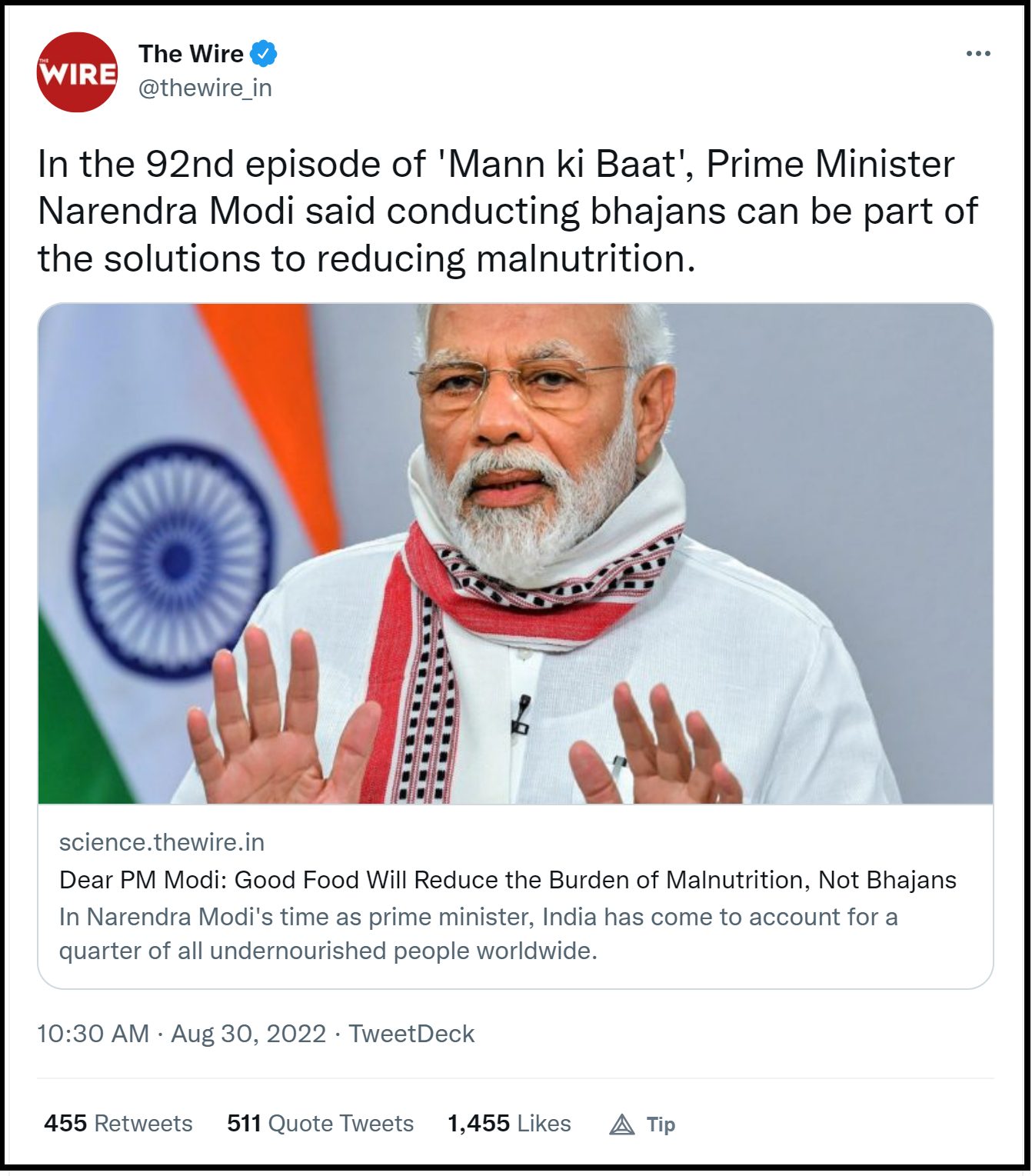
Quote-tweeting The Wire’s tweet, Dr Shashi Panja, the West Bengal women and child development minister, wrote, “Dear PM @narendramodi, availability and easy access to healthy food will reduce the burden of malnutrition, NOT BHAJANS.” She also called the PM “a colossal failure” when it comes to the lives of children of this nation.
Dear PM @narendramodi, availability and easy access to healthy food will reduce the burden of malnutrition, NOT BHAJANS.
Give up your stupidity! You are a colossal failure when it comes to improving the lives of our children in this nation. https://t.co/YYO1pLTMrT
— Dr. Shashi Panja (@DrShashiPanja) August 31, 2022
Ashok Swain, professor of peace and conflict research at Uppsala University, tweeted on the matter saying that “PM Modi says singing Bhajan (Hindu devotional song) can solve malnutrition problem.” His tweet garnered over 10k likes and 1000+ retweets.
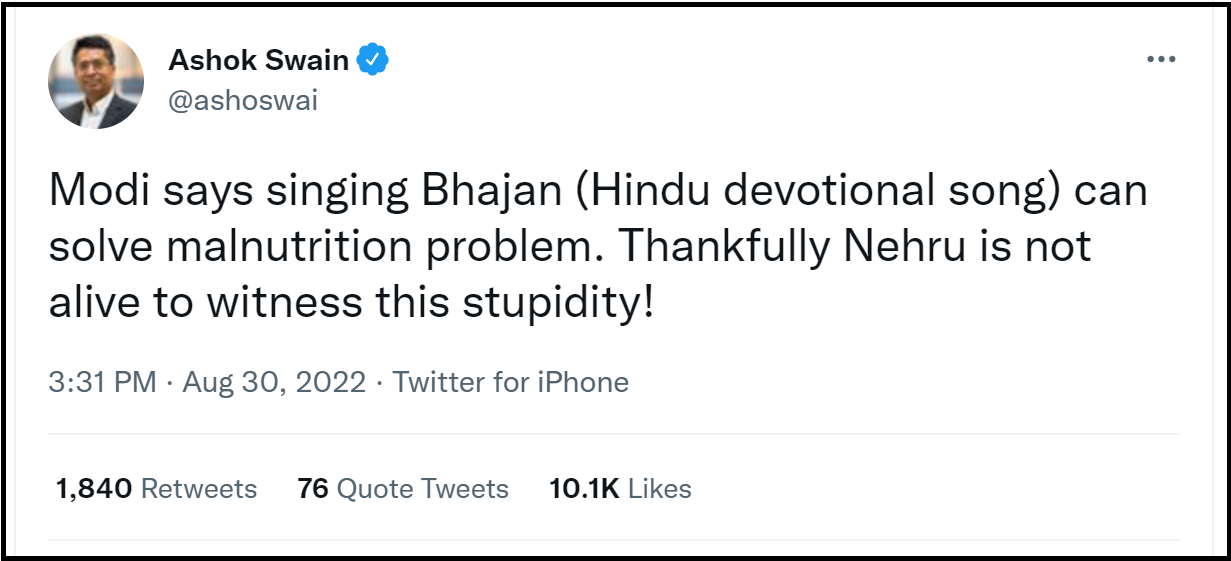
On August 31, Telangana Rashtra Samithi leader K.T. Rama Rao tweeted on the issue saying “I seriously hope it was a teleprompter typo where Bhojan was typed in as Bhajan”.
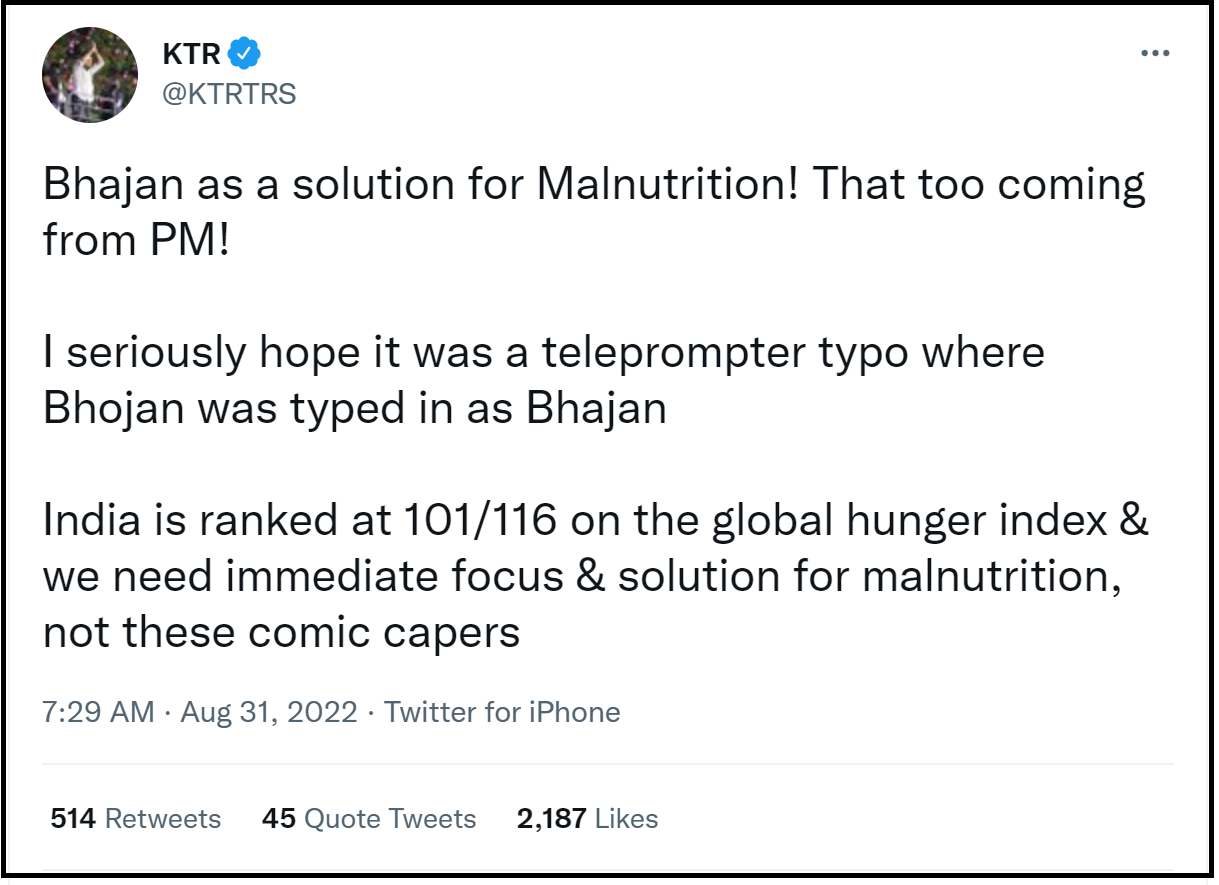
Fact-check
We carefully analysed the opinion piece written by Pankaj Kumar Mishra for The Wire Science and noticed that the author argues that the PM said that “conducting bhajans and singing devotional songs can help reduce the burden of malnutrition.” Below we have added the relevant portion from the piece.
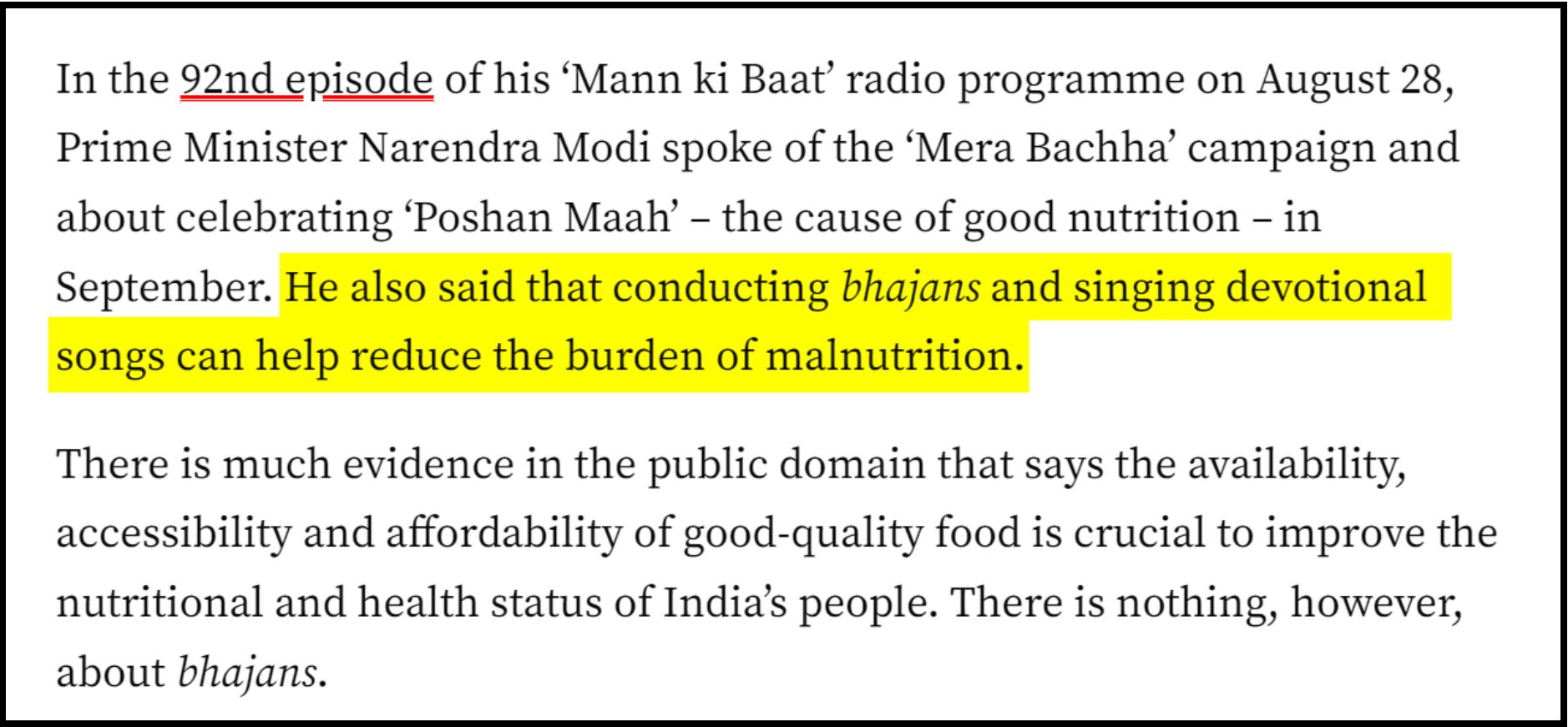
On the official YouTube channel of PM Narendra Modi, we found the clip of him talking about innovative campaigns to eradicate malnutrition. In this four-minute-long clip, the PM talks about three states — Assam, Madhya Pradesh and Jharkhand — where local administrations have come up with innovative ways to tackle the problem.
At the 1:00 minute mark, while talking about Madhya Pradesh, the PM says “Can you imagine that songs, music and bhajans can also be used to fight malnutrition?” He goes on to say that in the Datia district of Madhya Pradesh, under the “Mera Bachha Campaign”, bhajan-kirtans were organized in which teachers, known as nutrition gurus, were called. He further adds that a ‘balbhoj’ or meals for children event is also organised using grains provided by women to the Anganwadi centre.
Alt News accessed the English translation and the Hindi transcription of the address through the website of All India Radio (AIR). Below we have added the Hindi transcript of the segment:
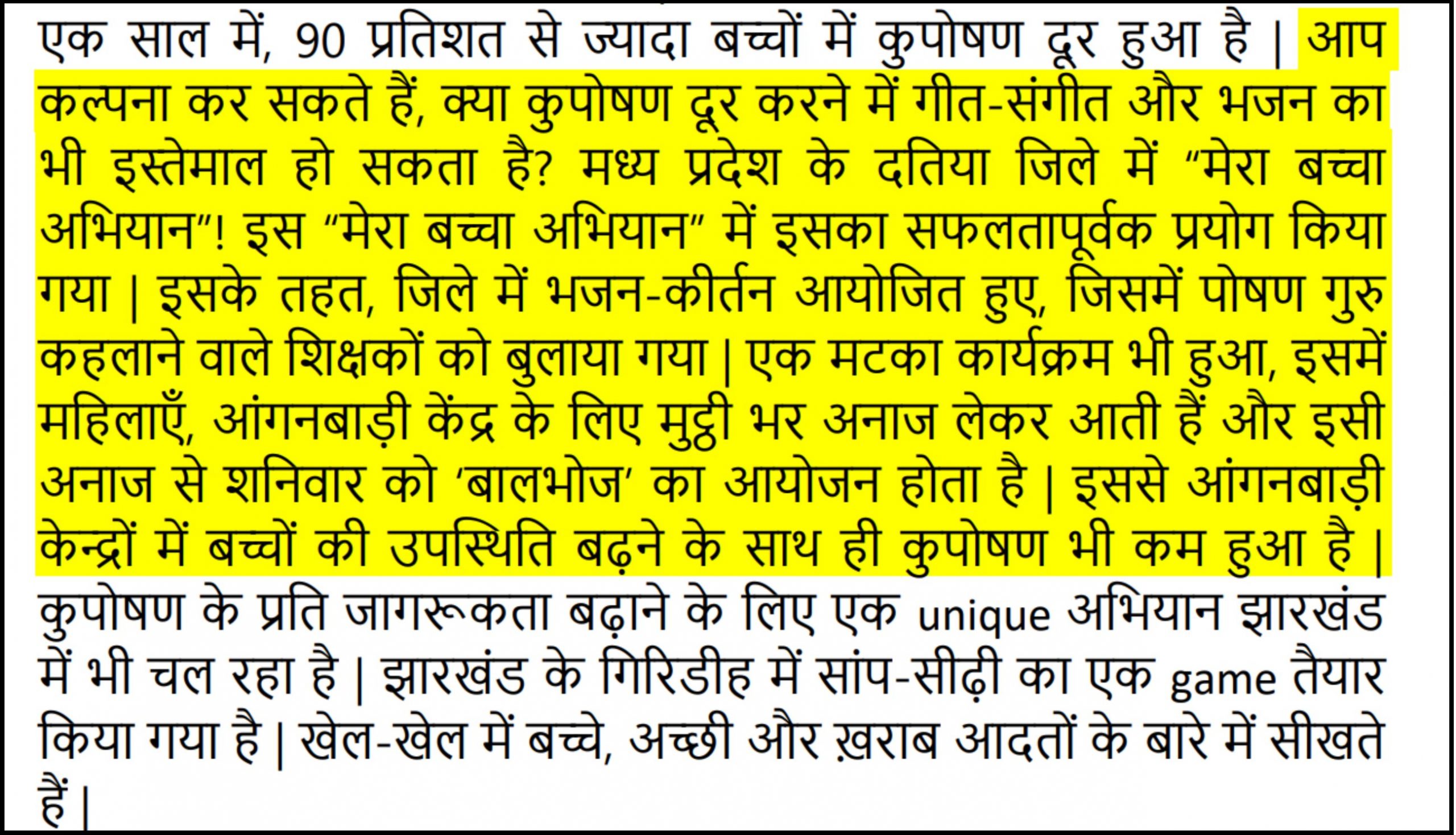
The English translation of the script available on the AIR website was inaccurate. However, a different translation was provided on the official YouTube channel of PM Narendra Modi which was more faithful to the original Hindi speech. It says:
“Can you imagine that songs, music and bhajans can also be used to fight malnutrition? It was successfully used in ‘Mera Baccha Abhiyan’ in Datia, Madhya Pradesh. Under this bhajan-kirtan programs were organised in the district, where teachers known as ‘Poshan Guru’ were called. A ‘matka program’ is also organised. In this, women bring a fistful of grains to the Anganwadi Centre and with these grains ‘bal bhoj’ is organised for children on Saturdays. This helped in increasing the attendance of children in Anganwadi Centres and also decreased malnutrition.” (sic)
It is quite evident from this excerpt that the Prime Minister did not say Bhajans can be a solution to the problem of malnutrition. His speech rather focused on how local administrations had come up with unique solutions to fight malnutrition, among which bhajan-kirtan was a crucial tool. In fact, using various art forms to raise awareness is not uncommon at all. We can find instances of them in the battle against climate change or Covid-19.
Mera Baccha Abhiyan
To gather more information on Mera Bacha Abhiyan, Alt News reached out to Arvind Upadhyay, the district program officer (women & child development), Datia. “We organised these bhajan sessions in the afternoon when the women of the area are most free. We noticed that nobody wanted to hear lectures in their free time, so we sang Bhajans to gather them at one place. Then we used songs called ‘Suposhan Geet’ to raise awareness on nutrition,” Arvind said.
“We started in September of 2019 and in the initial phase things were unorganised, but today we have everything in order. Bhajans are used to gather an audience. The Poshan Gurus are school teachers who talk about nutrition after school prayers or after a lecture. There are qualified volunteers as well who are considered Poshan Gurus. We also have nutrition clubs where we hold orientation for people. We received an award this year for our efforts to eradicate malnutrition,” he added.
Datia district received Prime Minister’s Award for Excellence in Public Administration on April 21, 2022.
Upon request, Mr Upadhyay shared a video of such a session with us, where women are singing about the benefits of having green vegetables.
When asked whether the Bhajan Kirtan sessions were the primary reasons for the decrease in malnutrition, Upadhyay said, “It was one of the many tools that we used to raise awareness.”
He also shared a presentation of the Mera Baccha Abhiyan programme details with Alt News. There are multiple mentions of ‘poshan guru’ and ‘bhajan kirtan mandli’ in the presentation.
Analysing the cycle of misinformation
There are multiple factors that led to the misinterpretation of PM’s speech. The programme aired on August 28 and the opinion piece on The Wire Science was published on August 30. Between these two days, there was no ‘outrage’ on social media.
Misleading caption & headline
It is pertinent to look at the caption of the tweet by The Wire. The caption says PM said, “…Bhajans can be part of the solutions…” but it fails to capture the essence of the speech. The PM was talking about innovative ways local administrations are fighting malnutrition among which was bhajan-kirtan as a tool to distribute information on malnutrition. This crucial information did not make it to the caption and hence a cycle of misinterpretation began.
The evidence that The Wire’s tweet was misinterpreted can easily be figured out when we do an advance search on Twitter. One of the first tweets about Bhajans is by All India Radio News on August 28 and it has only 20 retweets. Meanwhile, the tweet by The Wire on August 30 has over 500+ quote tweets and 400+ retweets. This suggests that without reading the content of the article people had jumped to their own conclusion. It is a well-known phenomenon that people on Twitter jump to conclusions without opening and reading an article, that is one of the reasons why Twitter shows a prompt asking users to read before they retweet.
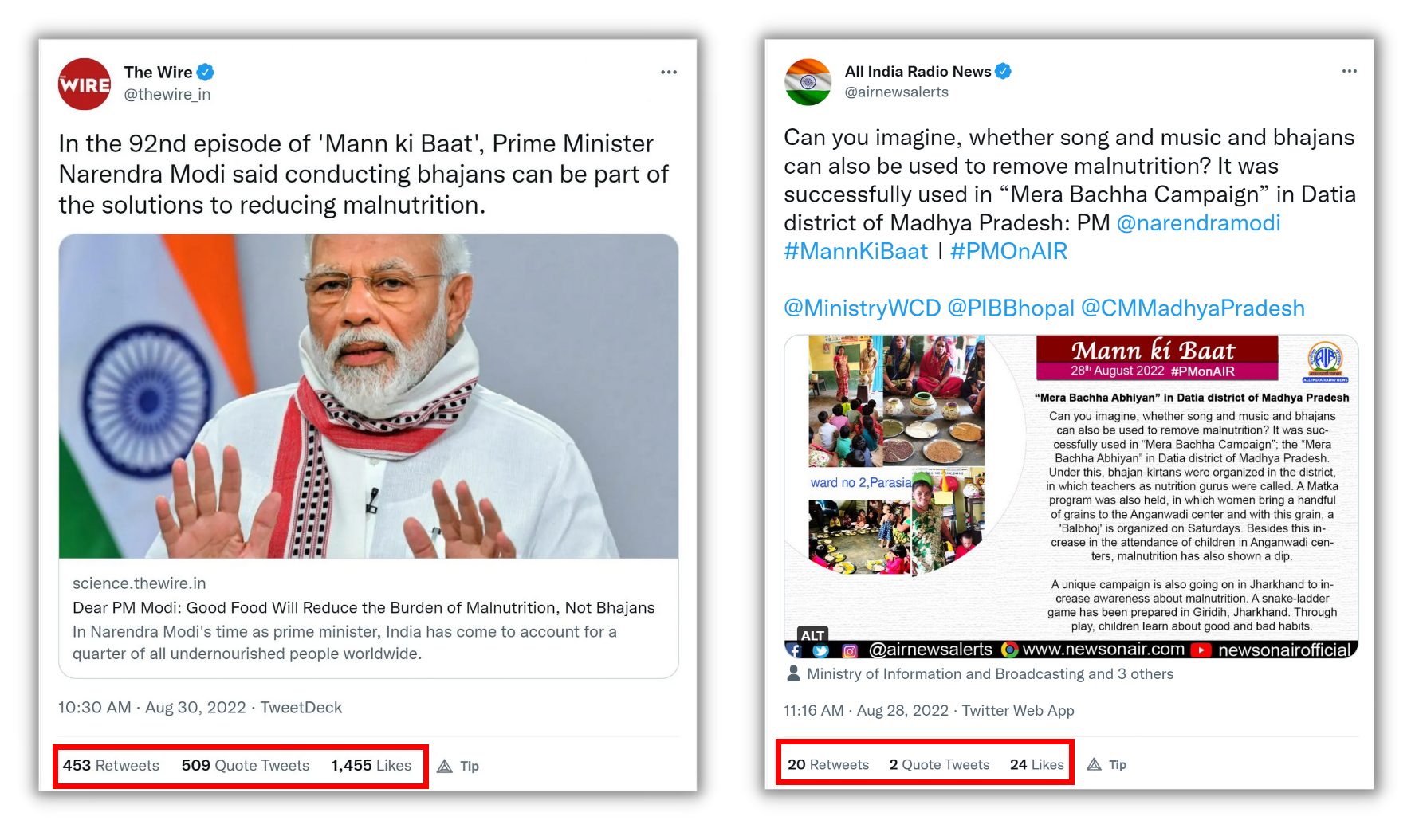
When we look further at the quote-tweets it is more evident that the users focused only on the tweet and not the article within the tweet.
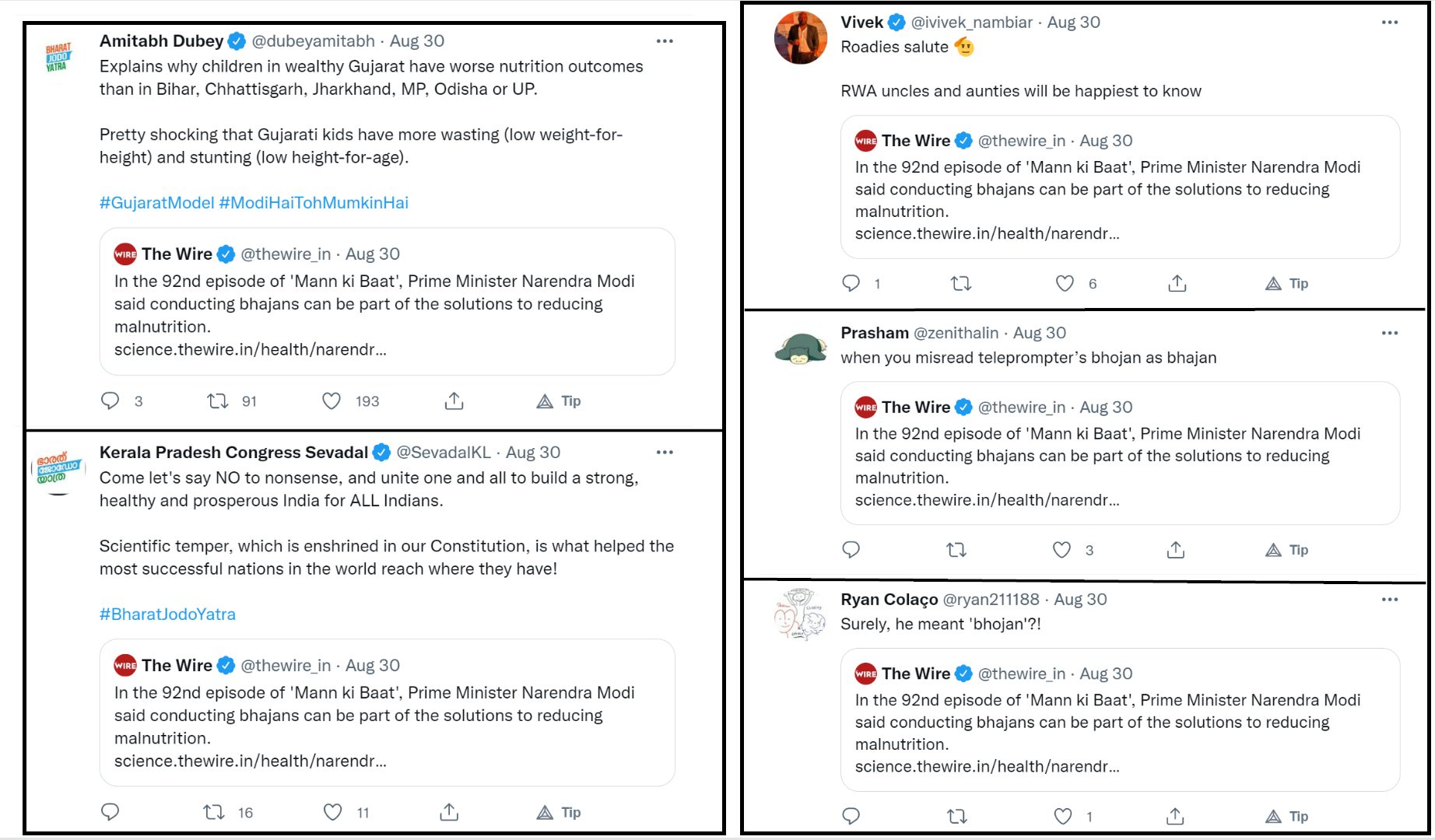
On Crowd Tangle, the social monitoring platform by Meta, we again noticed the same pattern. It was The Wire’s tweet that became the focus of the topic. Readers who have access to Crowd Tangle can view the extent of the impressions by clicking on this link.
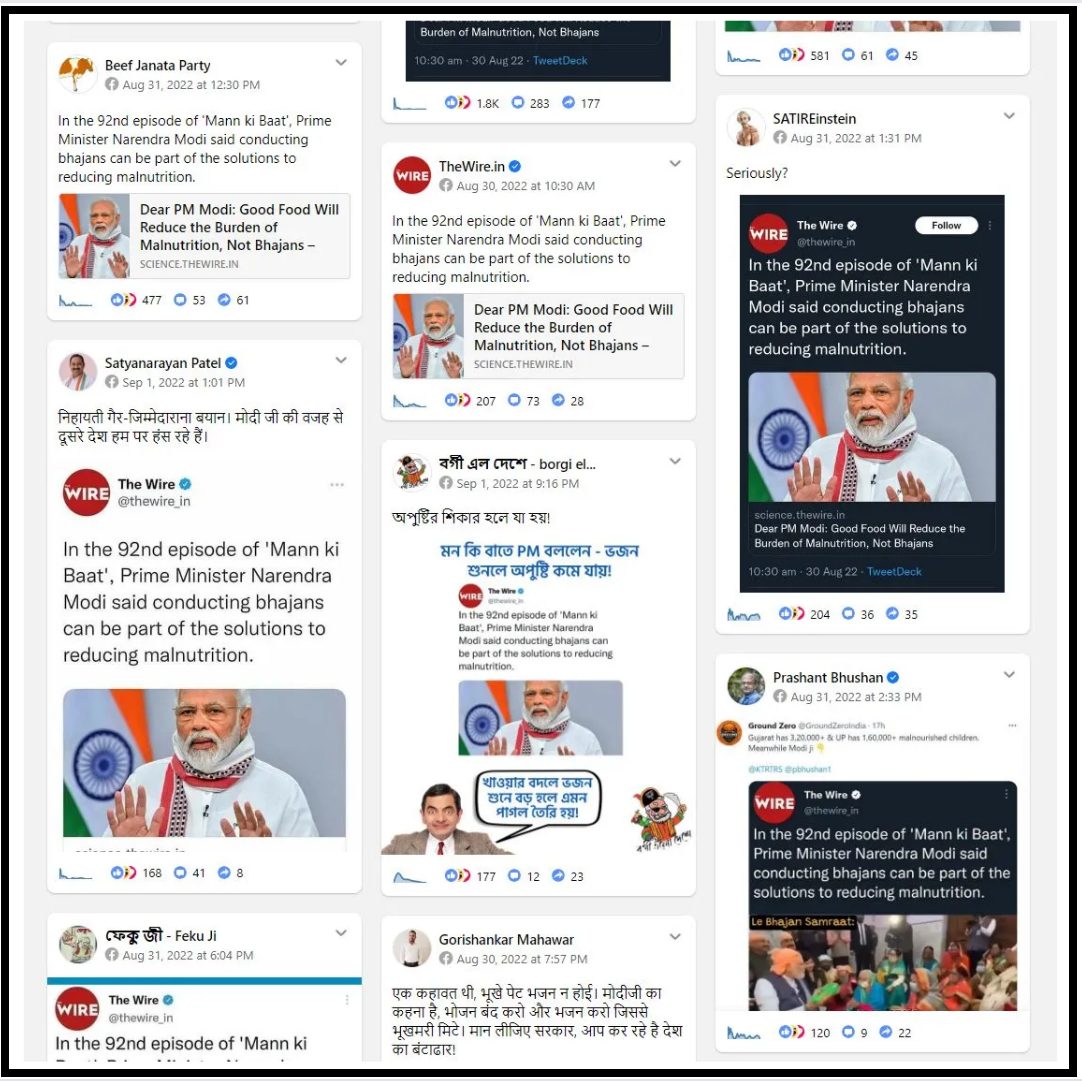
This claim eventually got detached from The Wire’s tweet and found an independent life of its own in popular culture in the form of cartoons, memes and infographics, with information which was totally opposite of what the PM said and what The Wire Science story suggested. Below we have added two such examples. One is a cartoon by Satish Acharya and the other is an infographic.
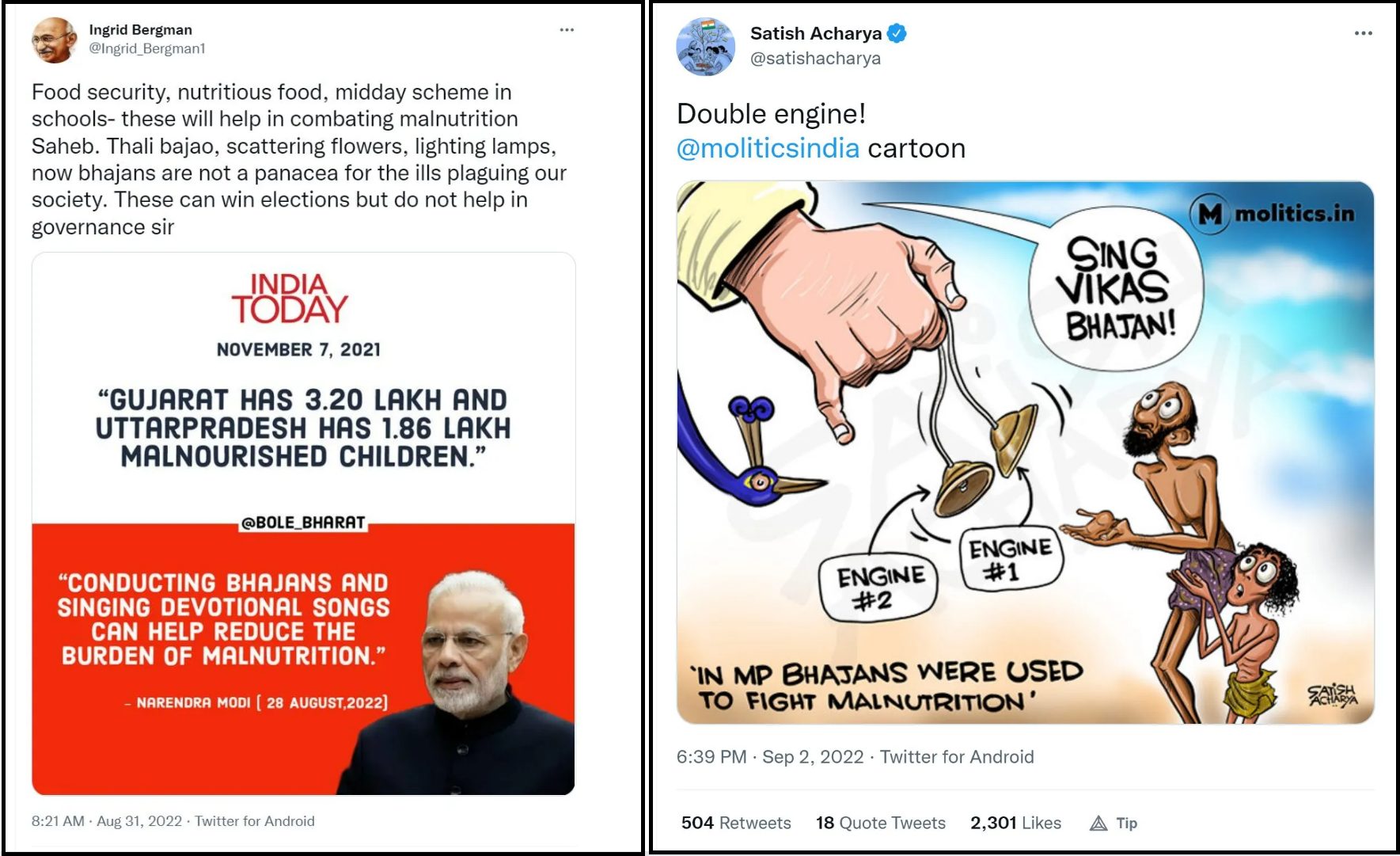
The headline of the article in The Wire Science, too, was misleading since it claimed, albeit indirectly, that the PM said bhajans could be used to reduce the burden of malnutrition.
Lack of details in the speech and inaccurate translation
The Prime Minister’s speech did not elaborate on how this ‘Mera Baccha Abhiyan’ programme worked. It did not explain the nature of these bhajan-kirtan sessions and the role of the ‘Poshan Gurus’. It was only after speaking to the District Program Officer of Datia, that Alt News was able to figure out how bhajan-kirtan sessions are used as a tool to gather an audience.
Moreover, the translation of the PM’s speech available on All India Radio’s website failed to capture the essence of his speech. Any non-Hindi speaker reading the translation is bound to have difficulties in figuring out what is being conveyed.
To sum it up, a segment in Mann Ki Baat where PM Modi spoke about innovative ways through which malnourishment was being tackled was misinterpreted by various social media users and prominent figures. This misinterpretation is also evident in the caption of a tweet by The Wire and in the headline of an article in The Wire Science, both of which failed to capture the nuances of the PM’s speech.
Independent journalism that speaks truth to power and is free of corporate and political control is possible only when people start contributing towards the same. Please consider donating towards this endeavour to fight fake news and misinformation.




